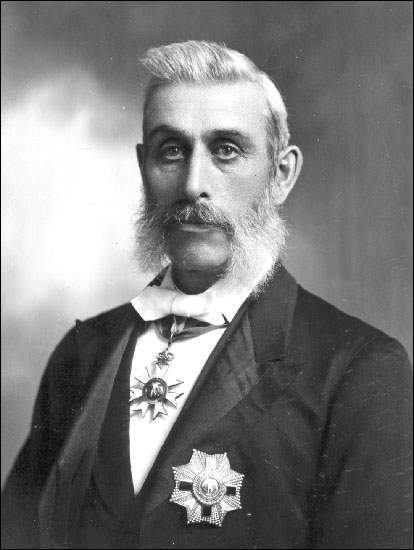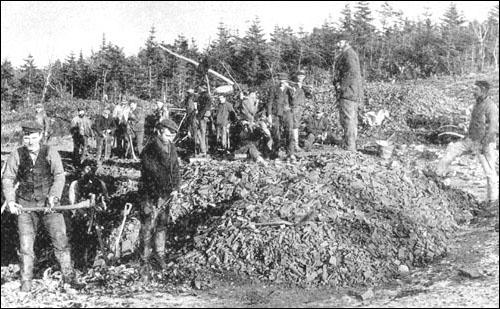Politics of Development, 1897-1914
When the railway main line was completed in 1897, it ran through either thinly populated country or uninhabited wilderness. There was little hope of there being enough traffic to cover expenses for a considerable time, and the colonial government faced the prospect of having to cover substantial losses from 1903. Until that time, the contractor who had built most of the railway for the government, R.G. Reid, was also the operator.
Negotiations with R.G. Reid
The Tory government of Sir James Winter, elected in 1897, was well aware of the country's current financial problems, and was apprehensive of the additional burden that would be imposed by operating the railway. Negotiations with Reid resulted in a solution. The railway would be handed over to Reid, along with the St. John's dry dock, the government telegraph system, substantial land grants (in addition to those Reid already held) and other concessions. Thus the government would be free of the financial strain of the railway system, and land-based economic development would become largely Reid's responsibility.

Contract Proposal
When the proposed new contract came before the legislature in 1898, the Liberal opposition, led by Robert Bond, split. Bond argued that the contract represented an unwarranted sell-out of the country's resources and assets to an outside contractor. Reid, he argued, might well become more powerful than the government and the legislature. But Edward P. Morris, an influential Liberal member for St. John's West, held that the contract was in the country's best interests: what mattered was jobs and development, not who owned the tracks. For the first time, the legislature faced a central question: at what point did justified concessions made to attract investment and new economic opportunities become improper sell-outs? What was the price of development?
The 1898 contract went through, but Winter's government rapidly fell apart. When it was defeated in the Assembly early in 1900, Bond was asked by Governor McCallum to form a government. Bond wanted to repeal the Reid contract, and he asked the governor to dissolve the legislature and call an election, so that he could obtain a majority and a mandate to do this. The governor refused - as he had the right to do - thus forcing Bond to come to an agreement with Morris, so that the Liberals could form a majority government. A compromise emerged: the Reid contract would be modified, but not abandoned.
In the new deal, signed in 1901, the railway, the telegraphs and some lands came back under government ownership. Reid received financial compensation, and permission to establish the Reid Newfoundland Company. Bond may have curbed the power and influence of the Reids, but they remained centrally important players in the country's politics and economy into the 1920s.
Economic Development Under Robert Bond
As premier, Bond pursued two main objectives in terms of economic development. First, he wanted to encourage diversification in the fishing industry - the catching of new species, and the development of different ways of processing and packaging - and to find new markets for Newfoundland fish in the United States market. Second, he wanted to see forest industries flourish and, especially, to get the pulp and paper industry established on the island.
These were not in themselves controversial issues. But Bond's fishery initiative involved the negotiation of a reciprocity (free trade) agreement with the US government, which failed because of protectionist opposition in the US Senate. His obsession with this issue caused increasing criticism, and contributed to his defeat in 1909.
Similarly, the terms of his government's agreement with the Anglo-Newfoundland Development Corporation [ANDC], the subsidiary the British Harmsworth newspaper empire which planned to build a newsprint mill at Grand Falls, was attacked by the Opposition when unveiled in 1905. The desirability of the mill was not in question. The problem was the concessions involved, which many thought were far too generous. Bond's willingness to make concessions to ANDC was contrasted with his opposition to the 1898 Reid deal.
But Bond faced a dilemma. Either he showed generosity in terms of extensive timber leases, low rentals and a favourable tax regime, or the Harmsworths might well walk away and establish their mill on the mainland. Bond was the first, but by no means the last premier to face this kind of situation. And like many of his successors, he judged that a new industry and the jobs it brought was, in the end, the most important consideration.
Thus the Grand Falls deal was approved (with some modifications), and the Bond government went on to conclude another agreement with the British papermaker A.E. Reed to build a pulp mill at Bishop's Falls. Newfoundland now had a third staple industry to add to the fishery and mining - an industry which had increased its importance with the opening of the iron mines on Bell Island in the 1890s.

Economic Development Under Edward Morris
In the 1909 election, Bond was defeated by his former lieutenant Edward Morris, who had formed the People's Party two years previously. Morris' approach to economic development was not significantly different from that of his predecessor, except that he was markedly more friendly to the Reid Newfoundland Company. The building of uneconomical, loss-making branch railway lines, Morris' major initiative, was dictated more by political than by economic considerations. These years also saw a wave of speculation in timber lands, in Labrador as well as the island, but little resulted in the way of productive employment. Though interested in fisheries reform and development, Morris found himself unable to balance the needs and demands of the Board of Trade (which he was instrumental in founding in 1909), and the newly-formed and militant Fishermen's Protective Union. As a result, little was accomplished in that sphere either.
By 1914 the Newfoundland economy was significantly more diversified than in the mid-19th century. Colonial governments had done a great deal to encourage this trend, though at some cost both in terms of heavy expenditures (enshrined in the public debt) and the alienation of resources for relatively low financial returns. All the same, Newfoundlanders were proud of what had been achieved, even if there was general agreement that Newfoundland and Labrador had a greater potential than had been realized so far.
Criticim of the Development Plans
Historians have debated why more was not achieved. Some have emphasized the fundamental importance of the country's resource base and geographical location. It produced large-volume, low price commodities, and was too far from both import and export markets. Thus low margins and high costs, added to the disadvantage of having a very small domestic market, made economic diversification and a stable prosperity difficult goals to achieve. From this point of view, there was not a great deal that governments and politicians could do.
Others have argued, however, that the problem in fact lay with the pro-railway enthusiasts of the later 19th century. Whiteway, Bond and others like them should not have placed so much emphasis on the island's land-based resources and spent millions on a railway. Instead, they should have encouraged the country to build on its strengths, which were marine, not land-based. The fisheries, shipping and shipbuilding, rural development - these would have shaped the road to a more stable future in both economic and political terms. A condition of this success, of course, would have been the ability and willingness of the often-criticized mercantile elite to cooperate with the colonial government, something which it was not always willing to do.
Whatever one makes of these rival positions, pre-1914 governments for the most part acted in good faith, followed the wisdom of their day, and tried to create more opportunities at home, and to stem out-migration. They were not entirely unsuccessful.




